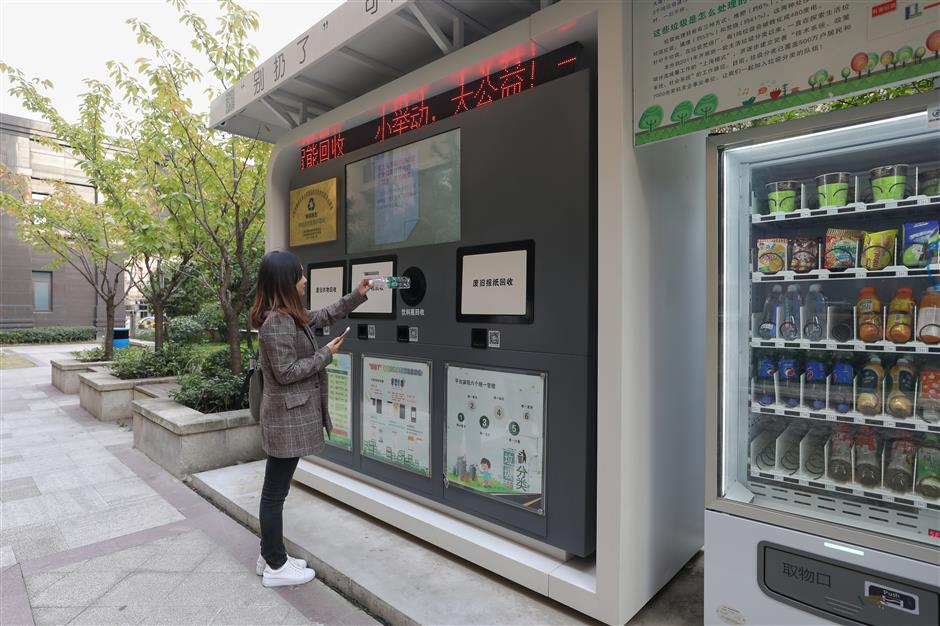Sorting out how to dispose of our garbage

A neighborhood sorting station in the Haiguan Ercun residential community gives residents clear choices on how to deposit rubbish.

A “smart” garbage collection station gives residents points for correct sorting.

A processing machine turns wet kitchen scraps into organic fertilizers.
Reduce. Reuse. Recycle. As Shanghai promotes measures to cope with volumes of urban garbage, the Jiangning Road Subdistrict has taken a leading role.
The subdistrict was a pioneer in starting garbage sorting in 2011. The project now covers all its neighborhoods. The secret of success? Get local residents involved.
In the Haiguan Ercun residential complex, resident volunteers patrol around the garbage disposal room, helping neighbors learn the right way to dump trash. They also have turned the garbage room into a “scenic spot” in the neighborhood.
“The garbage room used to be messy and smelly,” said Qin Bin, director of the subdistrict’s sanitation authority. “So we came up with plans to beautify it. To our surprise, local residents were enthusiastic about the idea. They appreciated that they were able to showcase the best Shanghai has to offer.”
On shelves in the garbage room there’s a display of miniature models of city landmarks such as the Oriental Pearl Tower and Shanghai World Financial Tower.
“It made resident feel proud of their city, encouraging them to be more involved in the maintenance and supervision of garbage disposal,” Qin said.
Currently, the subdistrict is promoting waste recycling in every neighborhood.
“Previously, waste recycling stations were commonly seen in downtown areas,” said Qin. “But in recent years, they gradually disappeared under urban renewal projects. Also, almost all of those stations were privately run and less regulated, resulting in unacceptable operations.”
To solve the problem, the subdistrict tied up with Alipay to launch a “waste recycling” service on a mobile application in August. Trial operation has begun in 10 neighborhoods.
It operates something like an online food-delivery service. With a tap of their phones, residents can make appointments for waste recyclers to come to their homes to pick up rubbish. Money is returned to the Alipay account.
“I saw the posters for the service, and I found it was as convenient as ordering take-out food,” said a Haiguan Ercun resident surnamed Zhu. “The likes of me, young white-collar workers, don’t have much time. I also plan to use the service to sell the old clothes and some newspapers.”
To ensure a safe, quality service, the subdistrict has worked with a professional recycling company with trained rubbish collectors, Qin said.
The service will be expanded to all neighborhoods in the subdistrict by the end of this year.
The subdistrict also has set up waste recycling stations in six neighborhoods and hopes to expand to every neighborhood soon.
“Our goal is to have a waste recycling station in every neighborhood,” Qin said. “The recycled waste is collected and transported to the subdistrict’s transfer station. From there, it goes to the Jing’an waste processing station.”
Advancing technology is aiding recycling efforts.
In the Nanyang Jiayuan residential complex is a “smart” machine for recycling bottles, newspapers, clothes, batteries, medicines and mobile phones.
Residents download a mobile application and scan the QR code to activate and open the right “mouth” to throw rubbish into. In return, they receive points that can be exchanged for drinks or other rewards.
The subdistrict also has a cluster of companies and eateries active in recycling.
The New Factories, an industrial park with nearly a third of its occupants foreign companies, has set a good example. In addition to sorting garbage, the site also has a processing machine to turn wet kitchen scraps into organic fertilizer.
“Currently, more than 200 kilograms of wet garbage are processed there in a day, producing some kilograms of fertilizer,” said Dong Linjun, manager of The New Factories. “It greatly reduces our costs of transporting the wet garbage away from the site. The fertilizer produced is so popular that demand exceeds supply.”
The fertilizer is used on public garden areas. Qin said it created a “virtuous circle” in the industrial park.
“We hope other office buildings will follow the lead of this pacesetter,” he said.
















